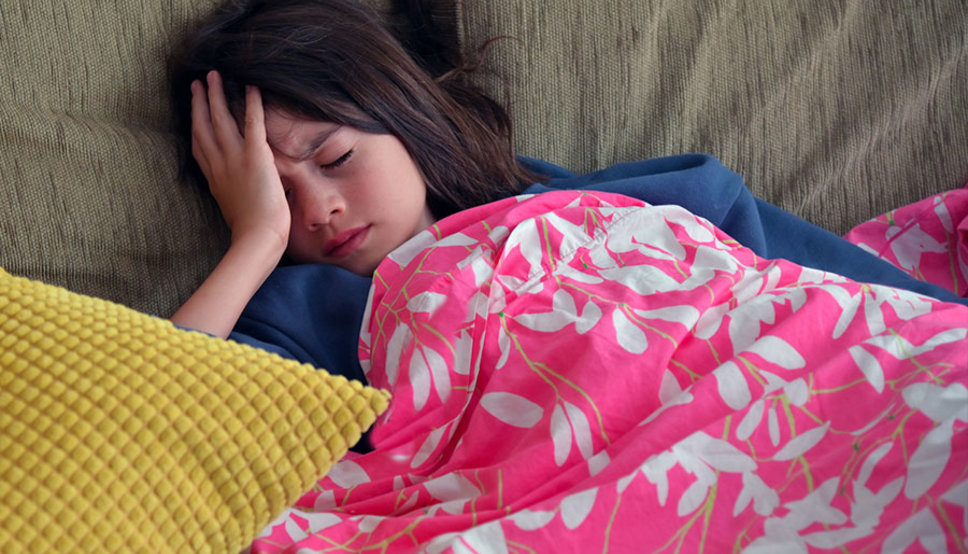Children, Headaches, and When to Worry

Headaches in children are common. While there are a variety of causes, most headaches are not serious. However, some situations may require medical attention and parents should know the warning signs.
Types of headaches in kids and their causes
Children may experience different kinds of headaches depending on the cause.
- Tension headache: This is the most common type of headache. Tension headaches may be caused by stress, poor posture, or lack of sleep. There is usually a slow onset of mild to moderate pain, often on both sides of the head, and may also include the back of the head and neck.
- Sinus headaches: A sinus headache is the result of an infection or allergy involving the sinuses (air-filled spaces in the skull). This type of headache is associated with pain in the forehead or around the eyes.
- Migraines: Some children experience migraines, which can be more severe and may be accompanied by symptoms like nausea, vomiting, and sensitivity to light or sound.
- Chronic daily headache: This is the term used to describe children who have 15 or more headache days per month. Chronic daily headaches are very frequent—It is estimated that as many as 1.5 percent of middle school students have chronic daily headaches.
Warning signs and when to worry about headaches in children
Headaches in children are common and usually not cause for concern. But parents should watch out for the warning signs or red flags of headaches that indicate something more serious.
If your child experiences any of the following, it is important to contact your child’s physician or seek help at an urgent care location.
- Explosive onset of severe headache: When a headache comes on suddenly and causes severe pain, it could be a sign of a serious condition such as meningitis or a bleed in the brain.
- Headache after a head injury: If your child had a head injury recently and then develops a headache, it is important to see a doctor to rule out a more serious condition such as concussion.
- Headaches with neurological symptoms: A headache that is accompanied by weakness, numbness or tingling, difficulty speaking, or vision changes may indicate a more serious issue and the child should be evaluated.
- Headaches waking the child from sleep: When a child experiences a headache that wakes them from sleep, or one that is worse in the morning, it could be a sign of something more serious and requires medical evaluation.
- Progressive or persistent headaches: If your child has a steady worsening of headaches, persistently frequent headaches, experiences pain that does not respond to over-the-counter medication, or has their daily activities affected by headache pain, consult a doctor.
Ways to treat a child’s headache
When your child’s head hurts, there are things you can do to help reduce the pain.
- Rest. Resting or sleeping in a cool, dark room can help reduce the pain of a headache.
- Cool compress. Placing a cool compress on the forehead, eyes, or back of neck can often help to alleviate a headache.
- Relaxation techniques. Stress management and relaxation methods such as deep breathing, progressive muscle relaxation, or even music can help to relax a child and reduce a headache.
- Food or water. If a headache is caused by hunger, give your child food, and for dehydration, give water, fruit juice or another source of hydration.
- Over-the-counter medications. Pain relief medications such as ibuprofen (Advil or Motrin) or acetaminophen (Tylenol) can help. Remember to never use aspirin in children under the age of 18.
What parents can do to help children with headaches
If your child is experiencing headaches, you may want to consider the following:
- Keep a headache diary: Keep a log that includes when headaches occur, how long they last, and any associated symptoms or triggers. This can help you and your child’s doctor identify patterns and triggers.
- Manage stress: We all have stress. It’s important to teach children ways to manage their stress, such as deep breathing, yoga, or mindfulness.
- Healthy lifestyle: As parents, it’s vital that you establish healthy routines for your child while they are young so they can carry those habits with them into adulthood. Be sure your child is getting adequate sleep, regular and nutritious meals, plenty of water, and regular exercise.
- Limit screen time: It’s critical for children to have limited screen time. Be sure you set boundaries and encourage breaks from screens. It’s also important to be sure that reading and homework is done in well-lit areas.
- Seek medical advice: If your child is experiencing headaches often or has any of the "red flag" warnings, it’s critical that your child see a healthcare provider for evaluation and diagnosis.
The good news is that most headaches in children are not serious. As a parent, you know your child best. Trust your instincts and seek medical advice if you have concerns about your child’s headaches.
For more tips on keeping your child healthy and safe, visit the Grow section of our Be Well health and wellness blog.
About the Author:
Brown University Health Blog Team
The Brown University Health Blog Team is working to provide you with timely and pertinent information that will help keep you and your family happy and healthy.
Find a Doctor

The right provider is in our network
Search more than 1,200 providers in our network.



